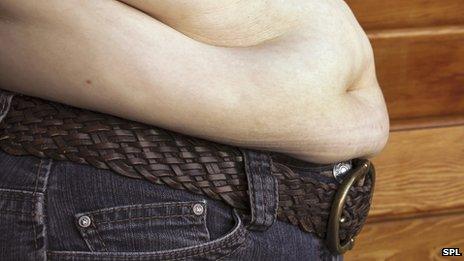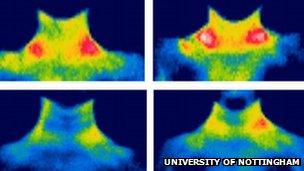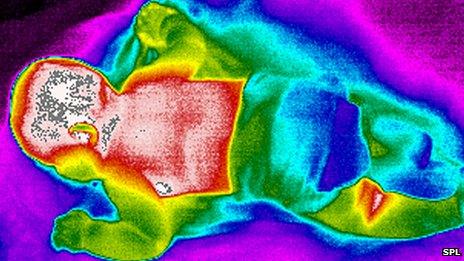Why brown fat is 'good' in the fight against obesity
- Published
- comments

White fat is the 'bad' stuff which stores energy rather than burning off calories
What produces 300 times more heat than any other organ in the body? What stops a baby from freezing to death if left in the cold? The answer to both questions is "brown fat".
Scientists have discovered that this type of fat is a good thing because it produces lots of heat by burning calories.
Unlike white fat, which clings to our hips and expands our ageing waistlines, brown fat keeps the weight off.
And that's why the race is on to find out more about brown adipose tissue, also known as brown fat, and how humans could use it to our advantage.
When we're born we have lots of brown fat in our bodies, wrapped round the central organs to keep us warm, to help us adapt to life outside the womb.
As we grow, however, the brown fat content of our bodies decreases.
Researchers at the University of Nottingham have been using heat-seeking technology to find out if brown fat is still present in children and adults.
In the neck
Professor Michael Symonds and Dr Helen Budge from the University's School of Clinical Sciences say their research, published in the <link> <caption>Journal of Pediatrics</caption> <url href="http://www.jpeds.com/" platform="highweb"/> </link> , shows that the neck region in healthy children produces heat.
"There is only about 50g of brown fat in the neck region and it switches on and off throughout the day as it's exposed to different temperatures or if you exercise or eat," says Prof Symonds.

Thermal imaging shows brown fat on a child's neck (in red) when their hand is put in cold water
But this capacity is much greater in young children compared with adolescents and adults.
He says that the challenge is now to use this knowledge to find out what factors might switch on brown fat, and therefore prevent excess weight gain.
"The more we know about what switches on brown fat the better. It may have an immediate effect which can be retained as you get older.
"This may provide new insights into the role of brown fat in how we balance energy from the food we eat, with the energy our bodies use up."
But could it have a role to play in fighting obesity too?
It's well-known that the UK has a weight problem. Just over a quarter of adults were classified as obese in 2010, a report from the NHS Health and Social Care Information Centre said earlier this year.
Sweaty bodies
If the power of brown fat can be harnessed then white fat's days could be numbered.
It's a nice theory, says Prof Sir Stephen Bloom, head of division for diabetes, endocrinology and metabolism at Imperial College London.
"If we activate brown fat, we can eat more and not gain weight. But we would waste energy unnecessarily, we would sweat a lot and forever be opening windows.
"We'd be hot and thin."
Anything that could mean calories are burned rather than being stored as fat sounds like a good idea - but there are dangers in using agents to activate body tissue.
"Agents have potential for toxicity. It's great if it works and it's safe, but everyone is nervous of the side effects of obesity therapies," Prof Bloom says.
Previous research on rodents and small mammals shows that they, like babies, rely on brown fat to keep warm.
"But this might not be so applicable in humans, particularly adults. That much brown fat is not natural in humans.

The baby's back is very warm (coloured red) due to the presence of large amounts of brown fat protecting its organs
"It would be hard work to stimulate everything that way."
Burn rate
Prof Symonds is more positive, believing that his team's research using thermal imaging could lead to more useful information on what we eat.
"Potentially we could add a thermogenic index to food labels to show whether that product would increase or decrease heat production within brown fat.
"In other words whether it would speed up or slow down the amount of calories we burn."
So fat is not as simple as it seems. There are different types and the brown stuff is much better than the white.
But we have no control over the quantities of each kind in our bodies, nor how it is managed.
In the future, Nottingham researchers will look at how nutrition, exercise, and environmental and therapeutic interventions could have an impact on brown fat and its unique heat-generating properties.
In the meantime, Prof Bloom says it's a very promising area to work on.
"It could be a help in the fight against obesity, diabetes and heart problems."
Are we nearly there yet? "There's a long way to go. A decade at least."
The war against white fat is only just beginning.
- Published3 May 2011
- Published7 September 2011